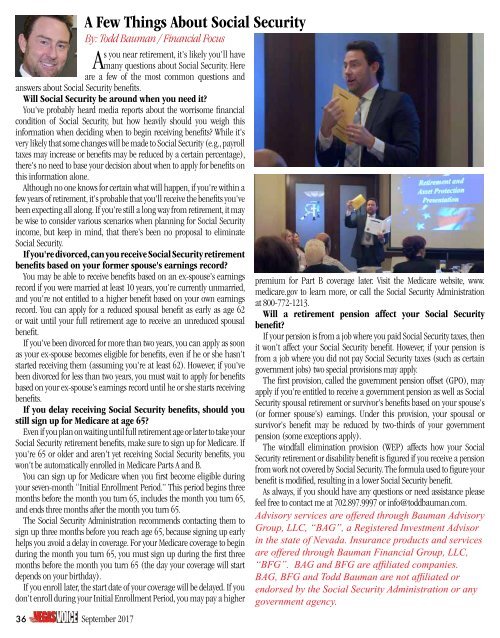10-17 web
Create successful ePaper yourself
Turn your PDF publications into a flip-book with our unique Google optimized e-Paper software.
As you near retirement, it's likely you'll have<br />
many questions about Social Security. Here<br />
are a few of the most common questions and<br />
answers about Social Security benefits.<br />
Will Social Security be around when you need it?<br />
You've probably heard media reports about the worrisome financial<br />
condition of Social Security, but how heavily should you weigh this<br />
information when deciding when to begin receiving benefits? While it's<br />
very likely that some changes will be made to Social Security (e.g., payroll<br />
taxes may increase or benefits may be reduced by a certain percentage),<br />
there's no need to base your decision about when to apply for benefits on<br />
this information alone.<br />
Although no one knows for certain what will happen, if you're within a<br />
few years of retirement, it's probable that you'll receive the benefits you've<br />
been expecting all along. If you're still a long way from retirement, it may<br />
be wise to consider various scenarios when planning for Social Security<br />
income, but keep in mind, that there's been no proposal to eliminate<br />
Social Security.<br />
If you're divorced, can you receive Social Security retirement<br />
benefits based on your former spouse's earnings record?<br />
You may be able to receive benefits based on an ex-spouse's earnings<br />
record if you were married at least <strong>10</strong> years, you're currently unmarried,<br />
and you're not entitled to a higher benefit based on your own earnings<br />
record. You can apply for a reduced spousal benefit as early as age 62<br />
or wait until your full retirement age to receive an unreduced spousal<br />
benefit.<br />
If you've been divorced for more than two years, you can apply as soon<br />
as your ex-spouse becomes eligible for benefits, even if he or she hasn't<br />
started receiving them (assuming you're at least 62). However, if you've<br />
been divorced for less than two years, you must wait to apply for benefits<br />
based on your ex-spouse's earnings record until he or she starts receiving<br />
benefits.<br />
If you delay receiving Social Security benefits, should you<br />
still sign up for Medicare at age 65?<br />
Even if you plan on waiting until full retirement age or later to take your<br />
Social Security retirement benefits, make sure to sign up for Medicare. If<br />
you're 65 or older and aren't yet receiving Social Security benefits, you<br />
won't be automatically enrolled in Medicare Parts A and B.<br />
You can sign up for Medicare when you first become eligible during<br />
your seven-month “Initial Enrollment Period.” This period begins three<br />
months before the month you turn 65, includes the month you turn 65,<br />
and ends three months after the month you turn 65.<br />
The Social Security Administration recommends contacting them to<br />
sign up three months before you reach age 65, because signing up early<br />
helps you avoid a delay in coverage. For your Medicare coverage to begin<br />
during the month you turn 65, you must sign up during the first three<br />
months before the month you turn 65 (the day your coverage will start<br />
depends on your birthday).<br />
If you enroll later, the start date of your coverage will be delayed. If you<br />
don't enroll during your Initial Enrollment Period, you may pay a higher<br />
36<br />
A Few Things About Social Security<br />
By: Todd Bauman / Financial Focus<br />
September 20<strong>17</strong><br />
premium for Part B coverage later. Visit the Medicare <strong>web</strong>site, www.<br />
medicare.gov to learn more, or call the Social Security Administration<br />
at 800-772-1213.<br />
Will a retirement pension affect your Social Security<br />
benefit?<br />
If your pension is from a job where you paid Social Security taxes, then<br />
it won't affect your Social Security benefit. However, if your pension is<br />
from a job where you did not pay Social Security taxes (such as certain<br />
government jobs) two special provisions may apply.<br />
The first provision, called the government pension offset (GPO), may<br />
apply if you're entitled to receive a government pension as well as Social<br />
Security spousal retirement or survivor's benefits based on your spouse's<br />
(or former spouse's) earnings. Under this provision, your spousal or<br />
survivor's benefit may be reduced by two-thirds of your government<br />
pension (some exceptions apply).<br />
The windfall elimination provision (WEP) affects how your Social<br />
Security retirement or disability benefit is figured if you receive a pension<br />
from work not covered by Social Security. The formula used to figure your<br />
benefit is modified, resulting in a lower Social Security benefit.<br />
As always, if you should have any questions or need assistance please<br />
feel free to contact me at 702.897.9997 or info@toddbauman.com.<br />
Advisory services are offered through Bauman Advisory<br />
Group, LLC, “BAG”, a Registered Investment Advisor<br />
in the state of Nevada. Insurance products and services<br />
are offered through Bauman Financial Group, LLC,<br />
“BFG”. BAG and BFG are affiliated companies.<br />
BAG, BFG and Todd Bauman are not affiliated or<br />
endorsed by the Social Security Administration or any<br />
government agency.<br />
37

















